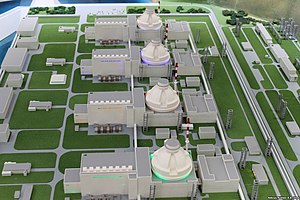Akkuyu Nuclear Power Plant
| Akkuyu Nuclear Power Plant | |
|---|---|
 | |
 | |
| Official name | Akkuyu Nükleer Güç Santrali A.Ş. |
| Country | Turkey |
| Location | Akkuyu, Mersin |
| Coordinates | 36°08′40″N 33°32′28″E / 36.14444°N 33.54111°ECoordinates: 36°08′40″N 33°32′28″E / 36.14444°N 33.54111°E |
| Status | Under construction |
| Construction began | December 2017 [1] |
| Commission date | 2023 (scheduled) |
| Construction cost | US$20 billion |
| Owner(s) | Akkuyu NGS Elektrik Üretim A.Ş. |
| Operator(s) | |
| Nuclear power station | |
| Reactor type | Gen III+ PWR |
| Reactor supplier | Atomstroyexport |
| Cooling source | Mediterranean Sea |
| Thermal capacity | 4 × 3200 MWth (planned) |
| Power generation | |
| Make and model | 2 x VVER-1200/509 2 x VVER-1200/513 |
| Units planned | 2 × 1114 MW |
| Units under const. | 2 × 1114 MW |
| Nameplate capacity | 4456 MW (planned) |
| External links | |
| Website | www.akkunpp.com |
The Akkuyu Nuclear Power Plant (Turkish: Akkuyu Nükleer Güç Santrali) is a nuclear power plant under development at Akkuyu, in Büyükeceli, Mersin Province, Turkey. It will be the country's first nuclear power plant.[2]
History[]
In May 2010, Russia and Turkey signed an agreement that a subsidiary of Rosatom — Akkuyu NGS Elektrik Uretim Corp. (APC: Akkuyu Project Company) — would build, own, and operate a power plant at Akkuyu comprising four 1,200 MW VVER units.[3] The agreement was ratified by the Turkish Parliament in July 2010.[4] Engineering and survey work started at the site in 2011.[5][6]
In 2013, Russian nuclear construction company Atomstroyexport (ASE) and Turkish construction company Ozdogu signed the site preparation contract for the proposed Akkuyu nuclear power plant. The contract includes excavation work at the site.[7]

The official launch ceremony took place in April 2015.[8] Major construction started in March 2018,[9] and the first unit is expected to become operational in 2023.[9][10] The other three units are expected to be complete by 2025.[9] On 9 December 2015, the news agency Reuters reported that Rosatom stopped construction work at the power plant and that Turkey was assessing other potential candidates for the project.[11] But Rosatom and the Turkish Energy and Natural Resource Ministry promptly refuted the statement.[12] Despite tensions mounted between Russia and Turkey, due to the Turkish downing of a Russian fighter jet on 24 November (2015), Russian President Vladimir Putin stated that the decision to continue is purely a commercial one.[13] A source told RIA Novosti that the company set up to construct the nuclear plant continued its operations in Turkey.[14]
In March 2019, the concrete basemat of unit 1 had been completed.[15]
Construction of the second unit started on 26 June 2020.[16] Steam generators for unit 1 were completed by Atommash later in August to be shipped to Turkey.[17] Around the same time, a core melt trap for unit 2 to contain a nuclear meltdown arrived at Akkuyu to be placed in the plant.[18] GE Steam Power is supplying four Arabelle steam turbines manufactured at Belfort, France, for the project, the first in January 2021.[19]
Finance[]
Financing is provided by Russian investors, with 93% from a Rosatom subsidiary. Up to 49% of shares may be sold later to other investors.[20] Potential investors are Turkish companies Park Teknik and Elektrik Üretim.[5]
Turkish Electricity Trade and Contract Corporation (TETAS) has guaranteed the purchase of 70% power generated from the first two units and 30% from the third and fourth units over a 15-year power purchase agreement. Electricity will be purchased at a price of 12.35 US cents per kW·h and the remaining power will be sold in the open market by the producer.[21] According to energy analysts this price is high.[22][23]
Flexibility[]
The minimum load for the plant is expected to be 50%. In normal operation power output could be decreased at 1% of the reactor’s nominal capacity per minute and increased at 3% per minute. In case of grid emergencies, these rates can increase to 20% and 5% respectively.[24] However, "load following mode generates more radioactive waste as a result of adjusting the coolant level and concentration of boric acid in the reactor".[24]
Objections[]
The most important objection is that Büyükeceli and the surrounding coastline may lose its touristic potential after the realization of the project.[25] However, the president of the township's commercial counsel Alper Gursoy also added that nuclear energy is necessary for Turkey's economy and that the construction of such a large plant may benefit the town economically.[26]
On 17 April 2011, a human chain was formed in Mersin to protest the decision.[27] It was planned that there would be 30 locations to form chains along the highway connecting Mersin to Akkuyu. But the participation was higher than the expected and several of these chains were merged. The east end of the chain was in Mersin midtown and it reached some 20 kilometres (12 mi) west along the highway uninterrupted. Also the settlements at the west including the district centers of Silifke and Erdemli as well as Büyükeceli, the town nearest to construction site participated. "The earthquake and tsunami in Japan proved how dangerous nuclear technology is," said Sabahat Aslan, a spokesperson for the Mersin Anti-Nuclear Platform. "We organized this protest to say 'no' to nuclear power plants, which will put future generations in danger".[28]
On 12 January 2015, it was reported that the signatures of specialists on a government-sanctioned environmental impact report had been forged. The specialists had resigned six months prior to its submission, and the contracting company had then made unilateral changes to the report.[29] The revelation sparked protest in North Nicosia. The construction of the Akkuyu plant is controversial in Cyprus, due to its close proximity to the island.[30]
Reactor data[]
| Unit | Type / Model | Capacity | Construction start | Operation start | Notes |
|---|---|---|---|---|---|
| Akkuyu 1 | VVER V-509 | 1114 MW | 3 April 2018 | 2023 (planned) | [31] |
| Akkuyu 2 | VVER V-509 | 1114 MW | 26 June 2020[32] | 2024 (planned) | [33] |
| Akkuyu 3 | VVER V-513 | 1114 MW | 11 March 2021[34] | ||
| Akkuyu 4 | VVER V-513 | 1114 MW |
See also[]
- Nuclear energy in Turkey
- List of nuclear reactors#Turkey
- Electricity sector in Turkey
References[]
- ^ "Akkuyu construction formally starts". World Nuclear News. 12 December 2017. Retrieved 25 September 2020.
- ^ "Welcome to the site of Akkuyu NPP JSC!". Akkuyu NGS location. Akkuyu NGS A.Ş., akkunpp.com. Retrieved 2 October 2012.
- ^ "Russian plant for Turkey's Akkuyu". World Nuclear News. 13 May 2010. Retrieved 13 December 2011.
- ^ "Governmental approval for Turkish construction plan". World Nuclear News. 15 July 2010. Archived from the original on 4 March 2016. Retrieved 13 December 2011.
- ^ Jump up to: a b "Site work to start for Turkish plant". World Nuclear News. 25 February 2011. Archived from the original on 4 March 2016. Retrieved 13 December 2011.
- ^ Ground broken for first nuclear plant amid safety concerns and protests Archived 14 April 2015 at the Wayback Machine
- ^ "Russia And Turkey Sign Akkuyu Site Preparation Contract". NucNet. 22 February 2013. Retrieved 3 April 2013.
- ^ "Ground broken for Turkey's first nuclear power plant". World Nuclear News. 15 April 2015. Retrieved 19 April 2015.
- ^ Jump up to: a b c "Russia starts building Turkey's first nuclear power plant". World Nuclear News. 3 April 2018. Retrieved 5 April 2018.
- ^ "Russia to complete Turkish NPP by 2023". Nuclear Engineering International. 26 August 2017. Retrieved 8 September 2017.
- ^ "Russia halts Turkey nuclear work, Ankara looks elsewhere". Thomson Reuters. 9 December 2015. Retrieved 22 December 2015.
- ^ "Construction of Turkey's first nuclear plant continues as planned". Daily Sabah. 9 December 2015. Retrieved 22 December 2015.
- ^ "Russia not to halt Akkuyu nuclear power plant in Turkey, Putin says". Daily Sabah. 17 December 2015. Retrieved 22 December 2015.
- ^ "Akkuyu nuke plant in Turkey to be decided by firms: Putin". Anadolu Agency. 18 December 2015. Retrieved 22 December 2015.
- ^ "Basemat of Turkey's Akkuyu 1 completed". World Nuclear News. 14 March 2019. Retrieved 15 March 2019.
- ^ "Росатом начал заливку бетона второго блока АЭС Аккую в Турции - Минэнерго Турции".
- ^ "Steam generators dispatched to Akkuyu unit 1 : New Nuclear - World Nuclear News". www.world-nuclear-news.org. Retrieved 2 September 2020.
- ^ "Core melt trap arrives for Akkuyu unit 2 : New Nuclear - World Nuclear News". www.world-nuclear-news.org. Retrieved 2 September 2020.
- ^ "First turbine module delivered for Akkuyu plant". World Nuclear News. 13 January 2021. Retrieved 13 January 2021.
- ^ "A case study of a Russian international project: Turkey's Akkuyu project". Nuclear Engineering International. 3 December 2012. Retrieved 3 January 2014.
- ^ "The Akkuyu Nuclear Plant: What Exactly is Going On?". turkeywonk.wordpress.com. WordPress.com. 16 April 2014. Archived from the original on 12 March 2016. Retrieved 21 January 2017.
- ^ DİRESKENELİ, Haluk (3 January 2020). "Enerji piyasalarında 2020 yılı öngörüleri - Haluk DİRESKENELİ". Enerji Günlüğü (in Turkish). Retrieved 4 January 2020.
- ^ Sonmez, Mustafa (15 December 2020). "Critics say Turkey's unfinished nuclear plant already redundant". Al-Monitor. Retrieved 15 December 2020.
- ^ Jump up to: a b "Nuclear Flexibility". Retrieved 26 December 2020.
- ^ "Mersin'de Yapılması Planlanan Nükleer Santral" [Making Planned Nuclear Power Plant in Mersin] (in Turkish). Anatolian Agency. 1 June 2010. Retrieved 13 December 2011.
- ^ "Mersin'de Yapılması Planlanan Nükleer Santral". June 2010.
- ^ "Online news" (in Turkish). Archived from the original on 23 March 2012. Retrieved 9 June 2015.
- ^ Hürriyet newspaper English edition
- ^ "Signatures on nuclear power plant environmental impact report forged". Today's Zaman. 12 January 2015. Archived from the original on 17 January 2015. Retrieved 18 January 2015.
- ^ "Lefkoşa'da Nükleer Karşıtı Yürüyüş: 'Akkuyu'da Nükleer En Çok Bizi Etkiler'". Gazeddakıbrıs (in Turkish). 17 January 2015. Archived from the original on 18 January 2015. Retrieved 18 January 2015.
- ^ "Akkuyu 1". Power Reactor Information System (PRIS). International Atomic Energy Agency (IAEA). 24 September 2020. Retrieved 25 September 2020.
- ^ "Росатом начал заливку бетона второго блока АЭС Аккую в Турции - Минэнерго Турции".
- ^ "Akkuyu 2". PRIS. IAEA. 24 September 2020. Retrieved 25 September 2020.
- ^ "Akkuyu 3". Nuclear Engineering International. 11 March 2021.
- Nuclear power stations in Turkey
- Nuclear power stations with reactors under construction
- Buildings and structures in Mersin Province
- Nuclear power stations using VVER reactors
- Buildings and structures under construction in Turkey



